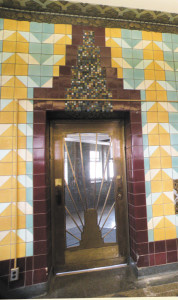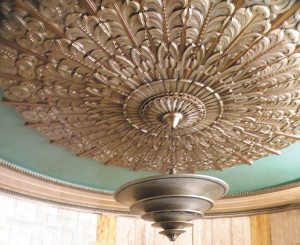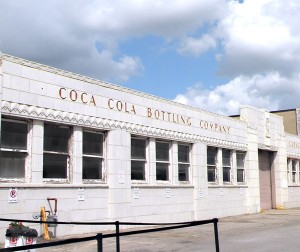The iconic Coca-Cola Bottling plant on Mass Ave. and College Ave. was sold last year to a developer, Hendricks Commercial Properties, from IPS, who has used the property as a bus hub for many years. Since the building went up in 1931, it has captured the attention of passerby because of its beautiful terra cotta exterior festooned with fountains and Art Deco ornamentation. Few have seen the inside of the building in years, unless they worked for IPS or worked in the plant until 1964, when Tony Hulman bought the bottling franchise and moved his collection of vintage cars in the building. IPS purchased it in 1968, where it was first converted to a central kitchen, used for storage and a woodworking shop, and as classrooms for experimental and adult education.
Indiana Landmarks has taken a keen interest in what will happen to the property — and the City of Indianapolis has also been involved in talks to make the most of this unique building and property. Several proposals for development were heard by IPS, city agencies, and Indianapolis Historic Preservation Commission. Hendricks won primarily due to their commitment to renovating and restoring the building as much as possible, including the exterior. Their plan, to be called the Bottleworks District, will create over 200 residential apartments and condos, plus a 160 room hotel complete with conference rooms and private meeting rooms, and a new roof that will offer a bar with stunning views of Mass Ave to downtown. The project is expected to be completed and ready for tenants in 2020.
The non-historic garages will be demolished and new retail space developed, plus parking. The Garage will also offer local, independent businesses an opportunity to develop. A total of 17 new buildings will be built.
Deputy Mayor Jeff Bennett said the city was excited to see the property be repurposed. “We see this as a catalyst for further community development. It will have real benefits for the community.”
Emily Mack, Director of the Metropolitan Planning Commission, said that the plans would “transform the area” while also preserving a key part of the history of Mass Ave. and Chatham Arch.
Inside among the dust and debris, visitors saw for perhaps the last time, the building before its renovation. The terrazo floors that held the bottling equipment (some of which is eroded due to acid from beverage spills), will be refurbished, as will the marble walls, the stamped tin ceilings. Throughout the second floor, Art Deco tiles grace walls and floors, including a stunning (and dizzying) tesselated black and white floor that will become a private dining area. Deep window sills of black marble invite visitors to peek out unto Mass Ave. to see the vibrant district with its blend of old and new.
The circular staircase at one end is a showstopping area with Art Deco chandelier,
wrought iron handrail, and a mosaic floor that screams elegance. Visitors were assured that the staircase would be restored to its former glory (it looked pretty grand even in a neglected state), with modern amenities.
Downstairs the old lobby will be the lobby for the hotel, with a restaurant just off the main area. It’s hard to believe the spectacular tilework on floors and walls was once in an industrial bottling plant. In fact, by 1950, the Indianapolis Coca-Cola Bottling plant was considered the largest in the world, employing 260 workers and housing 110 delivery trucks. Contrast the beauty of this plant with today’s concrete and steel industrial spaces, with little light and undecorated walls (save for a few safety posters).
Members of Indiana Landmarks also pointed out the white exterior terra cotta facade was created to suggest cleanliness and purity — sending a symbolic message to workers and Coke drinkers.
When the project is completed, the developers said they will probably hold an open house. Mark your calendar for 2020!





